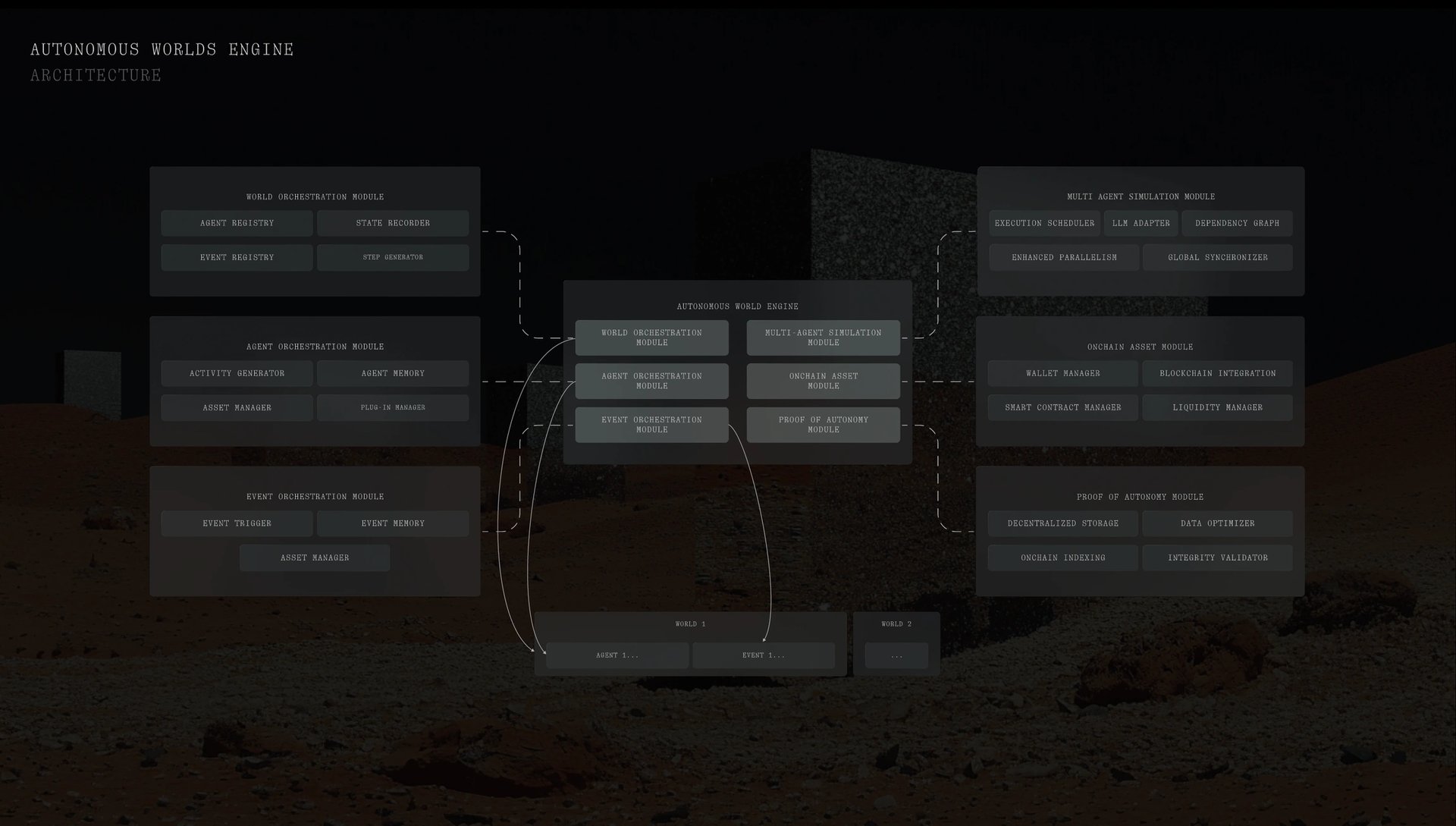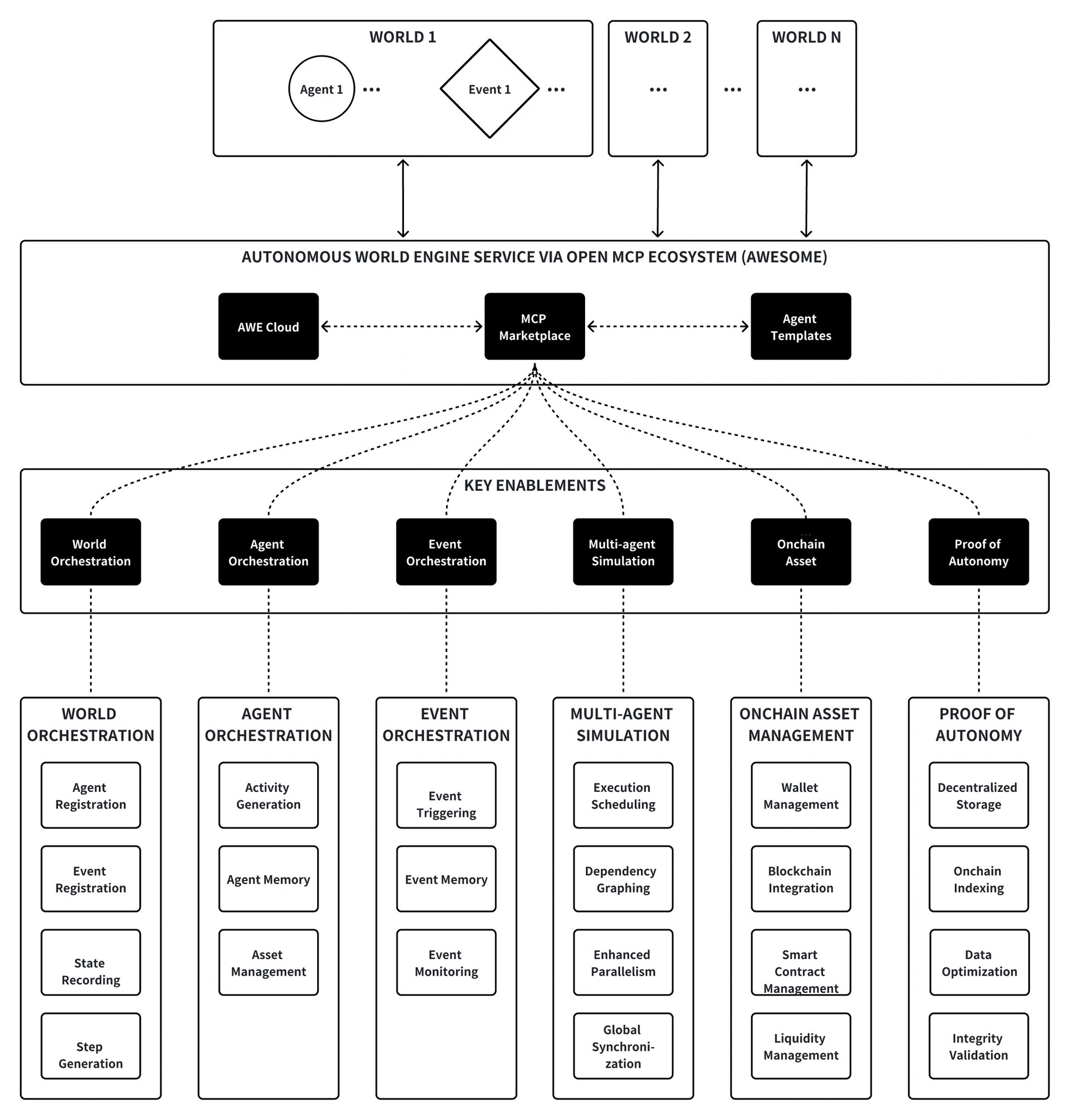위키 구독하기
Share wiki
Bookmark
AWE Network
0%
AWE Network
AWE 네트워크는 인공 지능으로 구동되는 지속적인 다중 에이전트 시뮬레이션인 자율 세계를 구축하고 확장하기 위해 설계된 인프라 스택입니다. 이는 에이전트 행동 관리, 가상 세계 오케스트레이션, 분산형 실시간 가상 환경을 지원하기 위한 온체인 기능 통합을 위한 모듈식 시스템을 제공합니다. [1]
개요
자율 세계 엔진(AWE)은 AWE 네트워크에서 개발한 기본 인프라 역할을 합니다. 그 목적은 자율 AI 에이전트와 인간 참가자가 채우는 대규모의 지속적인 환경을 지원하는 것입니다. AWE는 대규모 언어 모델(LLM)에 의해 구동되는 동작을 통해 복잡하고 스크립트되지 않은 상호 작용을 촉진하고, 병렬 실행, 종속성 인식 시뮬레이션 및 GPU 가속 처리를 통합하여 실시간 응답성을 보장합니다. 이 엔진은 모듈식 로직과 온체인 검증 가능성을 염두에 두고 설계되었으며 제작자와 개발자를 대상으로 합니다. 이는 사용자가 $AWE 토큰을 사용하여 사용자 지정 에이전트를 만들고 배포할 수 있는 AI 기반 자율 세계 출시를 지원하는 플랫폼인 World.Fun을 구동합니다. AWE는 AI 및 Web3 생태계 내에서 확장 가능하고 진화하는 시뮬레이션을 위한 기술적 백본 역할을 합니다. [2]
역사
AWE 네트워크는 2019년에 시작된 프로젝트인 STP 네트워크로 시작되었으며, 초기에는 분산형 거버넌스 및 실제 자산 토큰화를 위한 Web3 인프라에 중점을 두었습니다. 더 넓은 Web3 생태계가 성숙함에 따라 STP 네트워크는 2023년에 자율 세계 개발로 전환하면서 사명을 재정렬하기 시작했습니다. 이러한 전략적 전환은 AWNS(자율 세계 이름 서비스) 및 AI 강화 게임을 위해 특별히 설계된 레이어 3 플랫폼인 Clique와 같은 기본 도구를 도입하면서 시작되었습니다.
2024년 3분기까지 이 프로젝트는 이 새로운 비전에 완전히 전념하여 지속적이고 확장 가능하며 AI 네이티브 환경을 구동하도록 설계된 모듈식 시스템인 자율 세계 엔진(AWE) 개발로 이어졌습니다. STP 네트워크에서 AWE 네트워크로의 리브랜딩은 일반 인프라 개발에서 AI 에이전트와 인간 참가자 모두에 의해 형성된 대화형 공동 창작 가상 세계를 지원하는 것으로 전환되었음을 의미합니다. [3] [4].
기술
자율 세계 엔진(AWE)

AWE는 AI 에이전트가 협업하고 적응하는 지속적인 생태계를 만들고, 시뮬레이션하고, 진화시키도록 설계된 모듈식 프레임워크입니다. 그 아키텍처는 동적 에이전트 오케스트레이션, 이벤트 기반 진화 및 블록체인 기술을 통합하여 확장 가능하고 자립적인 자율 세계를 지원합니다.
AWE 프레임워크는 6개의 주요 모듈로 구성됩니다. [5]
- 세계 오케스트레이션: 에이전트와 환경 간의 상호 작용을 관리하여 자율 세계의 생성 및 운영을 관리합니다. 여기에는 에이전트 수명 주기를 추적하고, 세계 개발에 영향을 미치는 이벤트를 기록하고, 동기화된 세계 상태를 유지하고, 에이전트 기반 작업을 통해 시뮬레이션을 진행하는 시스템이 포함됩니다.
- 에이전트 오케스트레이션: 행동, 메모리 및 외부 상호 작용을 지시하여 자율 에이전트를 관리합니다. 내부 컨텍스트와 자극을 기반으로 에이전트 작업을 결정하고, 행동 기록을 저장하고, 온체인 자산을 감독하고, API 연결을 통해 외부 서비스와의 통합을 용이하게 합니다.
- 이벤트 오케스트레이션: 세계 역학 및 에이전트 행동에 영향을 미치는 이벤트의 생성, 메모리 및 모니터링을 관리합니다. 컨텍스트별 이벤트를 트리거하고, 과거 이벤트 데이터를 추적하고, 관찰된 결과를 기반으로 시뮬레이션을 조정합니다.
- 다중 에이전트 시뮬레이션: 실행 및 통신을 최적화하여 AI 에이전트 간의 확장 가능한 조정을 지원합니다. 성능을 향상시키기 위해 순서가 맞지 않는 스케줄링, 종속성 매핑 및 GPU 배포를 사용합니다. 글로벌 동기화 레이어는 일관된 상태 업데이트를 보장하고, LLM 어댑터는 언어 모델 제공자에 대한 액세스를 표준화합니다.
- 온체인 자산: 안전한 에이전트 관리 트랜잭션을 지원하여 자율 세계 내에서 블록체인 기반 경제를 지원합니다. 지갑 보안, 크로스체인 호환성, 스마트 계약 배포 및 유동성 인프라를 처리하여 에이전트가 솔라나 및 베이스와 같은 네트워크에서 재정적 자율성을 가지고 운영할 수 있도록 합니다.
- 자율성 증명: 에이전트와 해당 환경이 분산형 인프라를 통해 독립적이고 투명하게 작동하도록 보장합니다. 안전한 스토리지, 최적화된 온체인 데이터 관리, 암호화 검증 및 메모리 인덱싱을 결합하여 자율성, 검색 가능성 및 데이터 무결성을 보존합니다.
AWESOME

오픈 MCP 에코시스템을 위한 자율 세계 엔진 서비스(AWESOME)는 다양한 도구, 템플릿 및 모델 통합을 통합 플랫폼에 통합하여 개발자가 지능형 자율 세계를 구축하는 데 도움을 주도록 설계된 AWE 네트워크의 서비스 계층입니다. AWESOME의 주요 기능에는 AI 에이전트를 도구, API 및 외부 서비스에 연결하기 위해 통합된 MCP(모델 컨텍스트 프로토콜) 라이브러리를 제공하는 MCP 마켓플레이스가 포함됩니다. 또한 다양한 에이전트 유형에 대한 플러그 앤 플레이 로직 청사진인 에이전트 템플릿과 AWE 클라우드를 제공합니다. 이 통합 컴퓨팅 인터페이스를 통해 세계는 자연어 상호 작용을 통해 MCP에 액세스할 수 있으며, 사용량은 $AWE 토큰을 사용하여 추적 및 결제됩니다. AWESOME은 수동 API 설정 및 키 관리의 필요성을 줄여 개발을 단순화하여 에이전트 기반 세계를 더 빠르고, 비용 효율적이며, 더 구성 가능하게 만드는 것을 목표로 합니다. [6] [7]
생태계
World.Fun
World.Fun은 AWE 프레임워크를 기반으로 구축된 AI 기반 자율 세계를 위한 검색 및 배포 플랫폼입니다. 사용자는 AI 에이전트를 만들고, 사용자 정의하고, 동적으로 진화하는 지속적인 시뮬레이션에 출시할 수 있습니다. 이 플랫폼은 비동기 실행, 종속성 추적 및 GPU 최적화를 특징으로 하는 다중 에이전트 환경을 지원합니다. 1,000개의 AI 에이전트를 특징으로 하는 시뮬레이션인 "AI Town"으로 처음 출시된 World.Fun은 이제 여러 자율 세계를 지원하는 v2 업데이트로 확장되었습니다. 이러한 세계는 지속적인 메모리와 진화하는 행동을 가진 독립적으로 작동하는 AI 에이전트를 호스팅합니다. World.Fun은 또한 $AWE 토큰으로 구동되는 실시간 에이전트 추론을 용이하게 하고 에이전트의 직접적인 인월드 팁을 허용합니다. $AWE 토큰은 에이전트 응답, 메모리 활성화 및 프로그래밍 가능한 인센티브에 활용되어 모든 시뮬레이션에서 핵심 유틸리티 토큰으로서의 역할을 강화합니다. [8] [9]
월드 런치
월드 런치는 자율적 AI 기반 환경을 위한 World.Fun의 기본 런치 방법입니다. 이 형식은 AI 에이전트가 처음부터 경험의 중심인 라이브 대화형 제품(예: 시뮬레이션, 게임 또는 온체인 경험)을 소개합니다. 사용자는 캠페인 기간 동안 참여하며, 참여, 행동 및 기여도는 토큰 할당과 연결되어 추적됩니다. 각 런치는 생태계 전체에서 인센티브를 조정하도록 설계된 $AWE와 페어링된 유동성 풀을 포함합니다. 이 형식은 토큰 거래 전에 제품에 대한 사용자 상호 작용 및 이해를 우선시하며, 순전히 투기적 자산이 아닌 다중 에이전트 인텔리전스를 중심으로 구축된 애플리케이션을 구체적으로 대상으로 합니다. 월드 런치의 예로는 실제 창업자가 AI 심사위원에게 발표하고 판결이 온체인에 게시되는 라이브 피치 쇼인 "AI Shark Tank"가 있습니다. [10] [11]
AWNS
AWNS(.aw) 또는 자율 세계 이름 서비스는 AWE 생태계를 위해 특별히 설계된 디지털 ID 시스템입니다. 기존 Web3 이름 서비스와 달리 AWNS는 ERC-6551 표준을 통해 사용자 이름을 토큰 바운드 계정(TBA)에 직접 연결합니다. 즉, 각 ID는 지갑 역할도 하는 NFT 내에 포함됩니다. 이 설계를 통해 자율 세계, 온체인 게임 및 더 넓은 Web3 애플리케이션에서 원활하게 참여할 수 있으며, AWNS는 AI 기반 환경에 최적화된 ID 및 액세스 계층으로 자리매김합니다. [12]
AWE
$AWE 토큰은 AWE 네트워크의 기본 토큰입니다. 이전 $STPT 토큰을 1:1 전환 비율로 대체했으며 베이스 블록체인에 배포됩니다. $AWE는 AWE 네트워크 거버넌스, 시뮬레이션 비용 충당, 에이전트 팁 활성화, 자율 세계 내에서 실시간 추론 지원을 포함하여 전체 생태계에서 핵심 기능을 용이하게 합니다. 이 토큰은 World.Fun을 통해 AI 기반 환경을 시작하고 상호 작용하고, 에이전트 사회에 자금을 지원하고, 다양한 세계별 유틸리티를 지원하는 데 필수적입니다. 네트워크 내의 모든 상호 작용과 가치 캡처는 $AWE 토큰을 통해 흐르도록 설계되었으며, 장기적인 가치는 플랫폼 사용량과 토큰 보유자 거버넌스에 의해 영향을 받습니다. [3]
파트너십
잘못된 내용이 있나요?
